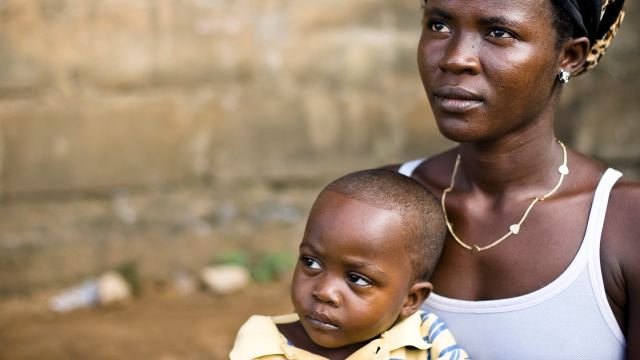Updated on September 9, 2024.
In 2023, there were 249 million cases of malaria reported worldwide, according to the World Health Organization (WHO). Of those, there were 608,000 deaths. Most of these cases and deaths took place in Africa, with 78 percent of all the malaria deaths being children younger than five.
In the early 2020s, two vaccines were approved by the WHO. Together, these vaccines offer unprecedented hope to millions. Here’s what you need to know about malaria and the two anti-malarial vaccines.
What is malaria, and how does it spread?
Malaria is a disease caused by a parasite that infects a particular species of mosquito. It spreads to humans when an infected mosquito bites someone and injects the parasite into their bloodstream.
People cannot spread malaria between each other like the flu—it is almost always transmitted through a mosquito bite. While it is possible for malaria to be transmitted through a blood transfusion, donor blood is screened for infectious diseases in the United States, and this is extremely rare.
Malaria is rare in the United States—only about 2,000 cases are reported each year, according to the Centers for Disease Control and Prevention. In parts of the world where malaria occurs on a broader scale, malaria is spread when adult female mosquitoes are able to use standing water to lay eggs, and people are unable to take enough protective measures, including:
- Installing screens in windows and doors
- Using insecticide-treated sleeping nets
- Using effective insect repellent
- Staying out of high-mosquito areas in the evenings and at night
Though eliminated from many parts of the world, malaria continues to occur in more than 100 countries, primarily tropical areas. About half of the world’s population is at risk. Young children, pregnant people, and people with HIV/AIDS are at greater risk of more severe infections and death.
Malaria symptoms and treatment
When a person is infected with malaria, at first the symptoms resemble the flu and include:
- Fever
- Chills
- Headache
- Aching muscles
- Vomiting
- Fatigue
If vital treatment isn’t given within 24 hours, the disease can sometimes become much more severe, causing coma, seizures, kidney failure, and death.
Effective treatments do exist. The most common treatment is artemisinin-based combination therapies (ACTs), which combines two or more different medicines that work in different ways to kill the parasites. Although the parasites have in some areas developed resistance to ACTs, according to the WHO, almost everyone who is treated is fully cured, even those who had parasites that are resistant to medication.
However, arguably the best way to deal with malaria is prevention.
How to prevent malaria
There are three main ways to prevent malaria:
Vector control interventions: This is the term for using insecticide and insecticide-treated bed nets as barriers between infected mosquitoes and humans.
Antimalarial medicines: Even though antimalarial medicines are designed to treat someone who is already infected, they can also be helpful for preventing the disease.
Vaccines: Two vaccines currently exist, and both are safe and effective when used to prevent malaria in children.
Malaria vaccines: a milestone
The search for a malaria vaccine has long been considered one of the world’s top public health goals, and it was extraordinarily difficult to develop an effective vaccine. The malaria parasite is a complex organism with many life stages and a remarkable ability to slip past the immune system.
After decades of research, and much trial and error, two effective malaria vaccines are now available: RTS,S and R21.
The first vaccine RTS,S was launched in 2019. Studies in Africa have found that this vaccine may reduce severe malaria in children by 30 to 70 percent, and that it is highly cost-effective.
In an historic first in 2021, these encouraging results led the WHO to recommend widespread use of the vaccine for children living in areas heavily affected by the disease. When given in four doses for children at least five months old, it offers some protection against Africa’s most common and most deadly malaria parasite, Plasmodium falciparum.
In an October 6, 2021, press conference, WHO director-general, Tedros Adhanom Ghebreyesus, PhD, called RTS,S a “gift to the world” and said it changed the course of public health history.
As of late 2023, the WHO reports that RTS,S has reached almost 2 million children, saving lives and lowering the number of pediatric hospitalizations for malaria.
The second malaria vaccine, R21, was also formally endorsed by the WHO in October 2023 as safe, effective for children, and cost-effective. R21 is expected to have a similar positive impact as RTS,S.
In an October 2, 2023, press release, Ghebreyesus noted that the demand greatly exceeds the availability of malaria vaccine, calling R21 “a vital additional tool to protect more children faster, and to bring us closer to our vision of a malaria-free future.”
Future potential
The two vaccines haven’t yet been tested together in a clinical trial to see which is more effective. But the WHO expects that tens of thousands of children’s lives could be saved once the two vaccines are made more widely available. In 2024, the RTS,S vaccine was made available in more African countries, and the R21 vaccine began to be made available to various countries.
The global health community is now weighing how to fund a broader rollout of malaria vaccinations, while individual countries affected by the disease will decide whether or how to work these vaccines into their own prevention programs.







